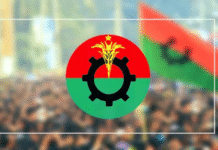Since Feb, there has been an outpouring of sentiment damning schools of hardline Islamism and its several leaders
A bus allegedly set on fire in Bogra, some 120kms north of Dhaka, by demonstrating Bangladesh Jamaat-e-Islami activists following a verdict banning the party from contesting 2014 elections. Photo: AFP
There are disquieting goings-on in Bangladesh, the country with which India shares its longest international border.
In a manner similar to India where, many observers believe, self-righteous politics is increasing chances of a hardline Hindu future, a wave of such politics in Bangladesh may be inviting a hardline Islamist future. This of course stems from the idea that such futures are divisive and hence of little good to countries overburdened with histories of divisiveness.
This assumes significance with the growing resentment in extremist and even in some moderate enclaves of opinion in Bangladesh about the pogrom-like mistreatment of the Rohingyas, who practice Islam, by ultra-nationalist elements, sometimes led by Buddhist clergy, in adjacent Myanmar. It is close enough, geographically and emotionally, to singe vulnerable pockets in India’s North-East and elsewhere.
There are other reasons for concern in Bangladesh. Since February, there has been an outpouring of sentiment damning schools of hardline Islamism and several of its leaders for complicity in killings and atrocities against fellow Bengalis in the 1971 war. The result of that war and the transformation of East Pakistan into Bangladesh has left enduring wounds.
Massive protests broke out in Dhaka in early February when Abdul Quader Mollah, a top leader of Jamaat-e-Islami Bangladesh, was sentenced to life imprisonment by a tribunal to judge pro-Pakistan war crimes during 1971; the anticipated sentence was death. Militant Islamists, students and others, struck back. Rioting and killing resumed after another leader was given the death sentence. More radical Islamist violence erupted in May when Hefazat-e-Islam, a relatively new coalition of hardline organizations, led a protest of thousands in Dhaka and elsewhere, demanding stricter laws based on Sharia. The sentencing for life in July of former Jamaat leader Ghulam Azam, 90, was another trigger.
With the cancelling of the registration of Jamaat in early August by Bangladesh’s high court, for its demand to implement Sharia law—deemed as contrary to the country’s secular constitution—only intensifies such protests. We may need to recognize a shift that, for the generations radicalized since the war, sentencing their leadership for past crimes, even heinous ones, amounts today to sentencing Islam.
All this has come towards the end of the current tenure of the ruling Awami League government led by Prime Minister Sheikh Hasina. Those of the League suffered greatly in 1971. Hasina personally suffered soon after as an army-backed coup killed her father and that country’s first premier, Sheikh Mujibur Rahman, and much of her family, as a reaction to administrative chaos and the absolutism of Mujib. This led to the rise of General Ziaur Rahman as the ruler of Bangladesh, a baton that eventually passed to his widow, Khaleda Zia. There is persistent enmity between Zia and Hasina. Zia has made no effort to conceal the tilt towards radical Islam of her Bangladesh Nationalist Party (BNP). It first allied with the Jamaat in the 1990s to form a government. Jamaat is now its partner in the opposition.
This past year’s slew of verdicts has now earned the radical propaganda veneer of a vendetta, of a timing to gain for Hasina and the League a booster shot before elections in 2014. Whatever emotional closure Bangladesh may need for its tragically wrenching birth, a concern is that it might earn for Jamaat and its radical allies, and even their patrons in the BNP, respite from electoral exile.
In late 2008, the League, in an encore of an earlier landslide, swept to power, earning 230 of 300 seats in parliament. The BNP won a paltry 30, Jamaat a minuscule two. But this means little in Bangladesh, where violent political mood swings are normal. Radical religionists could drive the next swing.
I recall a meeting in Dhaka with Azam in the 1990s when I was an editor with India Today. What he told me then appears as revealing, and portentous, now. “The Koran provides guidance,” Azam had told me. “And our orders come from Allah.”
Do you believe in democracy? I had asked. “Yes, we do,” Azam replied. “We are part of a democracy. But Allah’s code is not under a democracy. Democracy is under Allah’s code.”
People get nervous with strong Islamist groups, I had suggested. “Maybe it’s because they don’t believe in Islam’s precepts,” Azam replied. “And also because if we win, they will lose strength, they will be out of power.” Then, as if in a master class, he had explained: “We concentrate on people’s hearts, minds and characters… That is why our people don’t change allegiance.”
That allegiance appears to be increasing.
Source: Livement











Bangla News CAPTION- AZAM DENIED MEETING HIS FAMILY MEMBERS IN THE OCCASION OF EID.
The so called war crime charge was filed against 91 years old Professor Ghulam Azam, the ex-Ameer of the Jamaat-e-Islami Bangladesh, the largest Islamic party in the country by Hasina, almost 42 years after the creation of Bangladesh for his refusal to part with BNP and join, instead her party, the Awami League in an alliance when she visited him in his Dhaka residence. Vindictive Hasina took that refusal as an insult and wanted to teach him a lesson. Had he obliged her he would not have been charged as a “WAR CRIMINAL”. This case’s vindictive nature has been spelt out. By denying visit of the members of his family in the occasion of Eid Hasina has displayed her spirit of revenge that is open now for all to see. AFTER THE UNMASKING OF THE SKYPEGATE SCANDAL VINDICTIVENESS & POLITICAL MOTIVATION BEHIND THIS TRAVESTY BY THE NAME OF JUSTICE IS WELL EXPOSED. ANY SENSIBLE PERSON WOULD CONDEMN HER EFFORT TO SETTLE POLITICAL OLD SCORE BY ABUSING THE JUDICIARY AND TREATING IT AS A TOOL TO SMASH THE OPPOSITION.